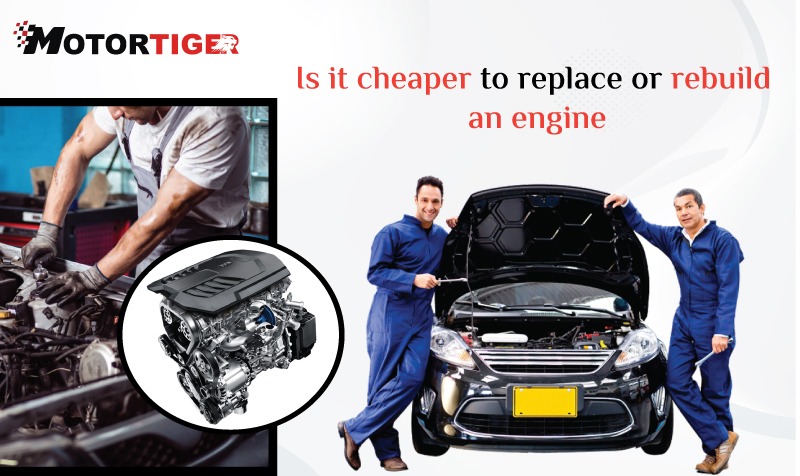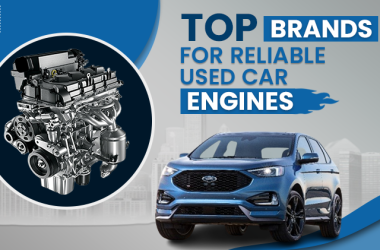When an engine fails, many automobile owners worry whether it is cheaper to replace or rebuild the engine. There is no clear answer to this question because the cost of replacement or rebuilding will be determined by various factors, including the type and model of the vehicle, the level of engine damage, and the cost of components and labour in your area. To assist you make an informed decision, we will explore the benefits and drawbacks of both replacing and rebuilding an engine in this blog.
Replacing an Engine
Engine replacement entails removing the old engine from the vehicle and installing a new or remanufactured engine. This is usually the more expensive choice because it entails acquiring an entire engine, which may cost thousands of dollars. Nonetheless, there are several benefits to replacing an engine, such as:
- Warranty: A warranty is normally included with a new or remanufactured engine, which can provide piece of mind in the event of any future problems.
- Time: Because it requires less labour, replacing an engine is usually a faster operation than rebuilding one.
- Resale value: A car with a new engine may be worth more than one with a restored engine.
Rebuilding an Engine
An engine is rebuilt by removing it, replacing any worn or damaged parts, and then reassembling it. Because it simply needs the purchase of parts and labour, this alternative may be less expensive than replacing the engine. However, there are certain drawbacks to rebuilding an engine, which include:
- Labor Costs: Rebuilding an engine might be more expensive than replacing it since it takes more time and expertise.
- Quality Control: The quality of a rebuilt engine varies based on the mechanic’s expertise and the quality of the parts utilised.
- Warranty: A rebuilt engine may not come with a warranty, which may pose a danger if it fails again in the future.
Which Option Is Cheaper?
The cost of the cheaper alternative will be determined by various criteria, including the make and model of the automobile, the amount of the engine damage, and the cost of components and labour in your location. On general, rebuilding an engine is less expensive than replacing it, although this will depend on your unique case.
Also Read: Best V8 Cars Engine Ever Used
Summary
Finally, whether it is cheaper to replace or rebuild an engine will depend on the specifics of your scenario. Replacing an engine is normally more expensive, but it includes a guarantee, a faster turnaround time, and a greater resale value. Although rebuilding an engine is less expensive, it has the disadvantages of greater labour expenses, poor quality control, and no guarantee. Eventually, the choice between replacing and rebuilding will be determined by your personal position and money.
FAQs
1. How can I determine whether my engine has to be replaced or rebuilt?
This will depend on your engine’s unique symptoms, but a mechanic can help you decide whether replacement or rebuilding is the best solution.
2. Is it always less expensive to restore an engine than it is to replace it?
No, not always. The cost of rebuilding an engine varies based on the amount of the damage, the cost of materials and labour, and other considerations.
3. What is the cost of replacing an engine?
The cost of replacing an engine varies greatly based on the car’s make and model, the type of engine fitted, and other factors. It can cost anywhere from a few thousand to tens of thousands of dollars.
4. What is the cost of rebuilding an engine?
The cost of rebuilding an engine varies based on the car’s make and model, the amount of the damage, the cost of materials and labour, and other considerations. It might cost anywhere from a few hundred to several thousand dollars.
5. Is it possible to rebuild any engine?
Certainly, as long as the engine isn’t too seriously damaged, it can be rebuilt.
6. How long does engine rebuilding take?
The time it takes to rebuild an engine is determined by the make and model of the vehicle as well as the depth of the engine damage.
7. How long would a reconditioned engine last?
If properly maintained, a rebuilt engine can last just as long as a new engine.
8. Can I rebuild my own engine?
Rebuilding an engine necessitates a high level of experience and specific tools, thus it is typically not advised to try it yourself.
9. Is there a warranty on a refurbished engine?
That is dependent on where the engine is rebuilt. Some stores may provide warranties, while others may not.
10. How can I locate a trustworthy professional to rebuild my engine?
There are several ways to locate a trustworthy professional to rebuild your engine:
- Ask for referrals from friends and family who have had their engines rebuilt. They may be able to recommend a mechanic or shop that they trust.
- Check online reviews of local engine rebuilders. Websites like Yelp and Google Reviews can provide helpful information on the experiences of previous customers.
- Look for certifications from reputable organizations like the National Institute for Automotive Service Excellence (ASE). Mechanics and shops that have earned these certifications have met rigorous standards for knowledge and expertise in their field.
- Check with your car dealership or manufacturer to see if they have a list of recommended engine rebuilders in your area.
- Ask for a detailed estimate from the mechanic or shop before you agree to have your engine rebuilt. Make sure the estimate includes the cost of parts and labor, as well as any warranties or guarantees that may be offered.
- Visit the mechanic or shop in person to get a sense of their professionalism and expertise. Ask questions about the rebuild process and make sure you feel comfortable with the answers you receive.
- Check with the Better Business Bureau (BBB) to see if any complaints have been filed against the mechanic or shop you are considering. This can give you an idea of their reputation and reliability.
By taking these steps, you can locate a trustworthy professional to rebuild your engine and ensure that your car is running smoothly and safely.
11. What is the distinction between a remanufactured and a rebuilt engine?
A remanufactured engine has been completely disassembled, cleaned, and rebuilt to meet or exceed the specifications of the original manufacturer. Just the damaged sections of an engine may be replaced in a rebuilt engine.
12. Can a repaired engine outperform a new engine?
Indeed, if done correctly and with high-quality parts, a properly rebuilt engine can be just as good as a new engine.
13. Does a rebuilt engine improve fuel economy?
Absolutely, if done correctly, a well rebuilt engine can enhance fuel efficiency.
14. Can a restored engine produce more horsepower?
Certainly, if done correctly and with performance parts, a well rebuilt engine can boost horsepower.
15. Does a rebuilt engine increase a car’s overall performance?
Absolutely, if done correctly and with high-quality parts, a properly rebuilt engine can increase a car’s overall performance.
16. How long does it take to break in a rebuilt engine?
It may take up to 1,000 miles for a rebuilt engine to break in, during which time it should be driven carefully and not pushed too hard.
17. How do I care for my rebuilt engine?
Frequent oil changes, appropriate engine warm-up, and moderate driving during the break-in phase can all assist to keep a rebuilt engine in good working order.
18. Can a repaired engine outperform a new engine in terms of dependability?
Absolutely, if done correctly and with high-quality parts, a properly rebuilt engine can be more reliable than a new engine.
19. Does a rebuilt engine reduce emissions?
Absolutely, if done correctly and with high-quality parts, a properly rebuilt engine can cut emissions






